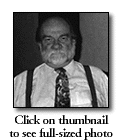Thomas J. Johnson
Consultant to the California (State) Department of Education
Hacienda La Puente Unified School District
(formerly La Puente Union High School District)
Adult Education Principal, Director, Senior Director
Assistant Superintendent, Adult and Alternative Education
1956-1993
Instructor in Adult and Career Education,
California State University, Los Angeles, 1970-75
and
University of California, Santa Barbara, 1973-74
Excerpt from an interview with:
THOMAS J. JOHNSON by LINDA L. WEST
February 23, February 24, & March 17, 1993
La Puente, California
JOHNSON:
— What we found was that the students with whom we were not successful with
open entry/ open exit, the students who couldn't handle individualized progress
at your own speed and couldn't work with the teachers when the teachers —
knowingly they would acknowledge it — were handicapped. And we were getting
them in such numbers that we really didn't know what to do, and a group of
managers and I set out to discover what was appropriate vocational education
for handicapped.It sounded like to us a very profound question, and we were
not familiar with the literature.
You know, we had visited the California Youth Authority, Youth Training School, YTS, in the Ontario area, Chino, when we first started vocational classes. Because, really, daytime vocational schools, other than private ones, the only one that was really operational in the area were some in the state prisons.So we looked at a lot of those as we created ours.We have always had in our minds the whole alternative ed serving the nonconforming kids along with adults.So the result of the investigation was simplistic.The most effective form of training of most handicapped is done in a sheltered workshop, and there are technical differences between a sheltered workshop, activity centers, et cetera, et cetera, defined primarily in federal law in the Department of Labor, and to a lesser extent under California law, but in a structured work for pay under the federal regulations that allow you to pay less than minimum wage, and all the various combinations of assembly line in house and outside work in crews and enclaves, with partnering, with sending a non-handicapped person as a coach for the handicapped person and have him stay with him however long is necessary for a person to be able to function on the job.
We began very early on to bring in translators for the deaf. Tremendous stuff. No longer true, but in those days the deaf, many, many deaf were shut up at home.Today there's kind of a bounty on them in terms of school districts, but we found many people and we began to bring in translators for the deaf.
Again, we were inundated at one point, and I think I have this in earlier notes, we had 1,700 active Department of Rehabilitation referrals, and it changed the whole structure of the State Department of Rehabilitation. Because before that they dealt exclusively with private vocational schools that were not public ed programs.Now they contract with ROPs and adult schools.

